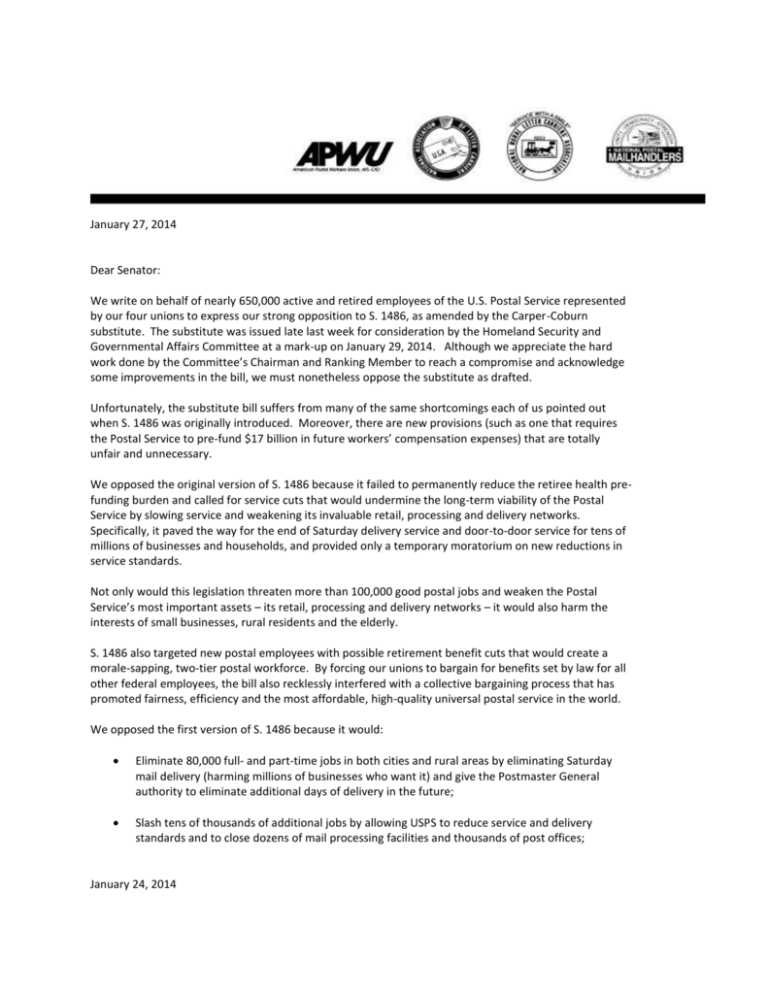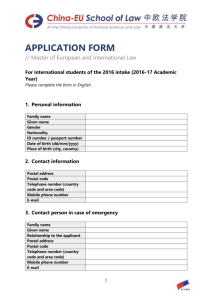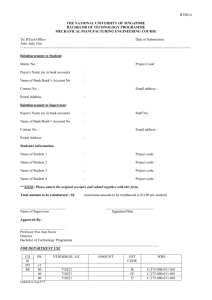January 27, 2014 Dear Senator: We write on behalf of nearly
advertisement

January 27, 2014 Dear Senator: We write on behalf of nearly 650,000 active and retired employees of the U.S. Postal Service represented by our four unions to express our strong opposition to S. 1486, as amended by the Carper-Coburn substitute. The substitute was issued late last week for consideration by the Homeland Security and Governmental Affairs Committee at a mark-up on January 29, 2014. Although we appreciate the hard work done by the Committee’s Chairman and Ranking Member to reach a compromise and acknowledge some improvements in the bill, we must nonetheless oppose the substitute as drafted. Unfortunately, the substitute bill suffers from many of the same shortcomings each of us pointed out when S. 1486 was originally introduced. Moreover, there are new provisions (such as one that requires the Postal Service to pre-fund $17 billion in future workers’ compensation expenses) that are totally unfair and unnecessary. We opposed the original version of S. 1486 because it failed to permanently reduce the retiree health prefunding burden and called for service cuts that would undermine the long-term viability of the Postal Service by slowing service and weakening its invaluable retail, processing and delivery networks. Specifically, it paved the way for the end of Saturday delivery service and door-to-door service for tens of millions of businesses and households, and provided only a temporary moratorium on new reductions in service standards. Not only would this legislation threaten more than 100,000 good postal jobs and weaken the Postal Service’s most important assets – its retail, processing and delivery networks – it would also harm the interests of small businesses, rural residents and the elderly. S. 1486 also targeted new postal employees with possible retirement benefit cuts that would create a morale-sapping, two-tier postal workforce. By forcing our unions to bargain for benefits set by law for all other federal employees, the bill also recklessly interfered with a collective bargaining process that has promoted fairness, efficiency and the most affordable, high-quality universal postal service in the world. We opposed the first version of S. 1486 because it would: Eliminate 80,000 full- and part-time jobs in both cities and rural areas by eliminating Saturday mail delivery (harming millions of businesses who want it) and give the Postmaster General authority to eliminate additional days of delivery in the future; Slash tens of thousands of additional jobs by allowing USPS to reduce service and delivery standards and to close dozens of mail processing facilities and thousands of post offices; January 24, 2014 Page 2 Mandate the elimination of door-to-door delivery of mail for all business and new households, and call for the phase out of door delivery to millions of established households – threatening at least 16,500 additional jobs; and Impose unfair and discriminatory reforms to the FECA workers compensation program that would leave injured federal workers with the worst long-term injuries vulnerable to impoverishment when they reach their Social Security retirement ages. Although the Postal Service has recovered as the national economy has gained momentum – it posted an operating profit of $623 million in 2013 and is projecting a $1.1 billion operating profit this year – we acknowledge that the Postal Service needs serious reform. This reform is needed to deal with both negative and positive technological change – electronic substitution of letter mail and the explosion in ecommerce -- and to overcome the crushing burden to pre-fund future retiree health benefits imposed by the PAEA in 2006 that no other enterprise, private or public, faces in the United States. That mandate was directly responsible for more than 80% of reported deficits between 2007 and 2013. We therefore offered the Committee an alternative package of reforms that would strengthen the Postal Service without damaging and self-defeating service cuts, and without unfair measures directed at postal employees who sacrificed greatly to help the Postal Service survive the Great Recession (absorbing nearly 200,000 job cuts and painful pay and benefit concessions in the last round of collective bargaining). Our package of reforms included: (1) PSRHBF and FEHBP reforms that would reduce retiree health cost and resolve the prefunding burden by properly investing the assets in the PSRHBF and even mandating our current and future retired members to enroll in Medicare programs which we have helped to fund with our payroll taxes; (2) a mandate to re-calculate postal pension surpluses with postal-specific assumptions to help pay down the Postal Service’s debt so that it could make desperately needed investments in its vehicle fleet and infrastructure; (3) a moratorium on service standard changes to prevent a death spiral; (4) a provision to give USPS limited authority to offer non-postal products through its networks to generate new revenues; and (5) pricing reforms to adopt a fair and more reasonable, yet predictable, price cap system. We hoped that the newest version of S. 1486 would embrace all these reforms, restoring the Postal Service to profitability and viability for years and years to come. Although the substitute bill you will consider this week adopted some of the reforms we have advocated (including the FEHBP reforms to resolve the pre-funding mandate and rate indexing reforms), it retains the misguided service cuts and unfair employee hits contained in the original bill. The substitute merely delays the proposed service and job cuts, but does not eliminate them. Indeed, delaying service standard reductions two years will not prevent the damage they will do to the quality of our service, which will simply drive business away; and setting an arbitrary mail volume trigger of 140 billion pieces for the elimination of Saturday delivery will not make degrading our last mile delivery network a more sensible business strategy for this most important public service. At a time when the demand for date-specific marketing and for same-day and next-day delivery service is growing, and at a time when and we are introducing Sunday service, legislated service cuts that would eliminate Saturday delivery, slow delivery times and reduce the demand for mail make no sense. The substitute also retains the unfair government-wide FECA reforms that do not belong in a postal bill. However, if the Committee decides to include FECA reform in this legislation, it should embrace the bipartisan reform bill (H.R. 2465) adopted by House of Representatives in the 112th Congress. January 24, 2014 Page 3 It also retains the outrageous provision that treats new postal employees as second-class citizens with regard to coverage under FERS and the Thrift Savings Plan. Finally, it adds new burdens such as the mandate to pre-fund future workers compensation benefits. No company or agency in America faces such an unreasonable burden. Even with the proposed $1 billion profit trigger for FECA pre-funding, the Postal Service will once again face a discriminatory funding burden. As with the Postal Service Retiree Health Benefits Fund, the Postal Service (i.e., postage rate payers) would be forced to invest in low-yielding Treasury securities to finance future FECA benefits instead of in an appropriate mix of stocks and bonds to secure earnings sufficient to cover future costs. In short, we would be forced to make low-interest loans to the Treasury. And as with the PSRHBF, once the payments are made into the proposed new trust fund, they cannot be refunded – even if projected workers’ compensation costs decline as they generally do when interest rates rise. In view of the foregoing, we urge you to vote against the substitute to S. 1486 as drafted at the mark-up on Wednesday. We regret that a more-limited, less-damaging bill is not being considered. We believe the Committee should focus on addressing the principal causes of the Postal Service’s fiscal problems, not reducing service and targeting postal employees’ benefits. But we pledge to work with all of you for postal reform that will strengthen the national treasure that is the U.S. Postal Service. We have directed our staffs to produce a detailed section-by-section analysis of the S. 1486 substitute. That will be provided before the mark-up. We, and they, are available at any time to discuss this legislation further. Sincerely, _____________________________________ Fredric V. Rolando, President National Association of Letter Carriers, AFL-CIO ______________________________________ Mark Dimondstein, President American Postal Workers Union, AFL-CIO _____________________________________ John F. Hegarty National Postal Mail Handlers Union, AFL-CIO _____________________________________ Jeanette Dwyer National Rural Letter Carriers Association







